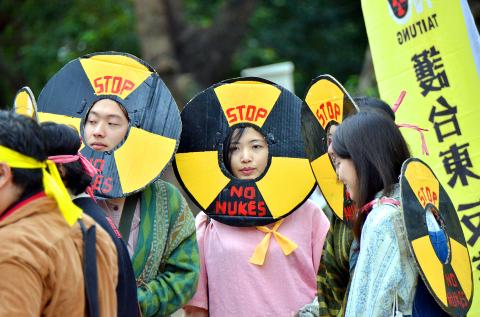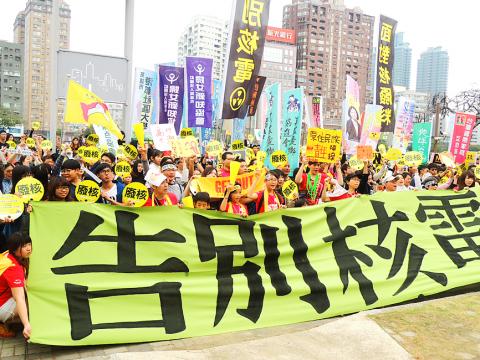An annual parade launched by a coalition of more than 60 groups opposed to nuclear power was held in Taipei yesterday.
Noting the anniversary on Friday of Japan’s Fukushima Dai-ichi nuclear disaster, the National Nuclear Abolition Action Platform said many people in Japan have been forced to move away from their homes due to radioactive contamination, and it does not want a similar situation in Taiwan.
The theme for the parade was “farewell nuclear power and facing nuclear waste,” with activists demanding a nuclear-free nation and a fair solution to nuclear waste disposal.

Photo: CNA
Other anti-nuclear protests were also held across the nation yesterday.
More than a dozen residents living near nuclear power plants in northern Taiwan joined a crowd led by New Power Party Chairman Huang Kuo-chang (黃國昌) to protest in front of the Jinshan Nuclear Power Plant in New Taipei City’s Shihmen District (石門), before moving onto the Guosheng Nuclear Power Plant in New Taipei City’s Wanli District (萬里) and then to the unfinished Fourth Nuclear Power Plant in Gongliao District (貢寮).
Bowing in front of a yellow banner with the names of deceased Taiwanese who had contributed to previous anti-nuclear events, and holding signs that read “30 to 40 years is enough,” “we are fed up with injustice,” and “we do not want to move 500km away from our hometown,” the protesters urged more young people to take a stand against nuclear power.

Photo: Ke Yu-hao, Taipei Times
“Standing up against nuclear power is definitely not something that only us who live in the north should do,” Northern Coast Anti-Nuclear Action Alliance chief executive Kuo Ching-lin (郭慶霖) said. “Are people waiting for the day a nuclear disaster occurs to start standing up against it?”
Meanwhile, Huang said that no one wants nuclear waste stored near their home.
“We need an independent public institution that can discuss the issues of how to dispose or where to place nuclear waste, under objective criteria and through democratic participation,” he said.
Taiwan Power Co (Taipower, 台電) cannot arbitrarily decide where high-level radioactive waste should be stored, he said, adding that nuclear waste disposal is an issue the new government and legislature must face seriously.
Despite the rainy weather, thousands of people, some dressed in costumes and holding handmade signs with anti-nuclear slogans, began gathering on Ketagalan Boulevard in Taipei at about 2pm to join the parade, which set off at 5pm and ended at Taipei’s North Gate (北門) at 6pm.
The platform urged new legislators to respond to their seven demands, including passing a “nuclear-free homeland act” and setting a schedule for nuclear power plant retirement, introducing an energy tax, abolishing the Fourth Nuclear Power Plant, monitoring radioactive contaminated food products and a fair nuclear waste disposal solution.
Attending the parade, Democratic Progressive Party (DPP) Legislator Chen Man-li (陳曼麗) said she is against Taipower’s suggestion to dispose of nuclear waste in other countries, and that the DPP agrees to conduct a comprehensive review on the ideas of an energy tax and standards for monitoring radiation-contaminated food.
A feature of this year’s parade was a 30m-long red banner with “10,000 years of nuclear waste” written on it.
The banner was held by protesters as they paraded through Taipei before they surrounded the North Gate, symbolizing how nuclear waste lasts much longer than any monument in human civilization, so Taiwanese should decide how to deal with it seriously.
The platform said about 7,000 people participated in yesterday’s parade.
President-elect Tsai Ing-wen (蔡英文) of the DPP did not take part in the parade, but she voiced her support on Facebook.
“Having a non-nuclear homeland is an objective that the DPP has insisted on,” Tsai said.
Additional reporting by Loa Iok-sin

DAREDEVIL: Honnold said it had always been a dream of his to climb Taipei 101, while a Netflix producer said the skyscraper was ‘a real icon of this country’ US climber Alex Honnold yesterday took on Taiwan’s tallest building, becoming the first person to scale Taipei 101 without a rope, harness or safety net. Hundreds of spectators gathered at the base of the 101-story skyscraper to watch Honnold, 40, embark on his daredevil feat, which was also broadcast live on Netflix. Dressed in a red T-shirt and yellow custom-made climbing shoes, Honnold swiftly moved up the southeast face of the glass and steel building. At one point, he stepped onto a platform midway up to wave down at fans and onlookers who were taking photos. People watching from inside

A Vietnamese migrant worker yesterday won NT$12 million (US$379,627) on a Lunar New Year scratch card in Kaohsiung as part of Taiwan Lottery Co’s (台灣彩券) “NT$12 Million Grand Fortune” (1200萬大吉利) game. The man was the first top-prize winner of the new game launched on Jan. 6 to mark the Lunar New Year. Three Vietnamese migrant workers visited a Taiwan Lottery shop on Xinyue Street in Kaohsiung’s Gangshan District (崗山), a store representative said. The player bought multiple tickets and, after winning nothing, held the final lottery ticket in one hand and rubbed the store’s statue of the Maitreya Buddha’s belly with the other,

‘NATO-PLUS’: ‘Our strategic partners in the Indo-Pacific are facing increasing aggression by the Chinese Communist Party,’ US Representative Rob Wittman said The US House of Representatives on Monday released its version of the Consolidated Appropriations Act, which includes US$1.15 billion to support security cooperation with Taiwan. The omnibus act, covering US$1.2 trillion of spending, allocates US$1 billion for the Taiwan Security Cooperation Initiative, as well as US$150 million for the replacement of defense articles and reimbursement of defense services provided to Taiwan. The fund allocations were based on the US National Defense Authorization Act for fiscal 2026 that was passed by the US Congress last month and authorized up to US$1 billion to the US Defense Security Cooperation Agency in support of the

‘COMMITTED TO DETERRENCE’: Washington would stand by its allies, but it can only help as much as countries help themselves, Raymond Greene said The US is committed to deterrence in the first island chain, but it should not bear the burden alone, as “freedom is not free,” American Institute in Taiwan Director Raymond Greene said in a speech at the Institute for National Defense and Security Research’s “Strengthening Resilience: Defense as the Engine of Development” seminar in Taipei yesterday. In the speech, titled “Investing Together and a Secure and Prosperous Future,” Greene highlighted the contributions of US President Donald Trump’s administration to Taiwan’s defense efforts, including the establishment of supply chains for drones and autonomous systems, offers of security assistance and the expansion of